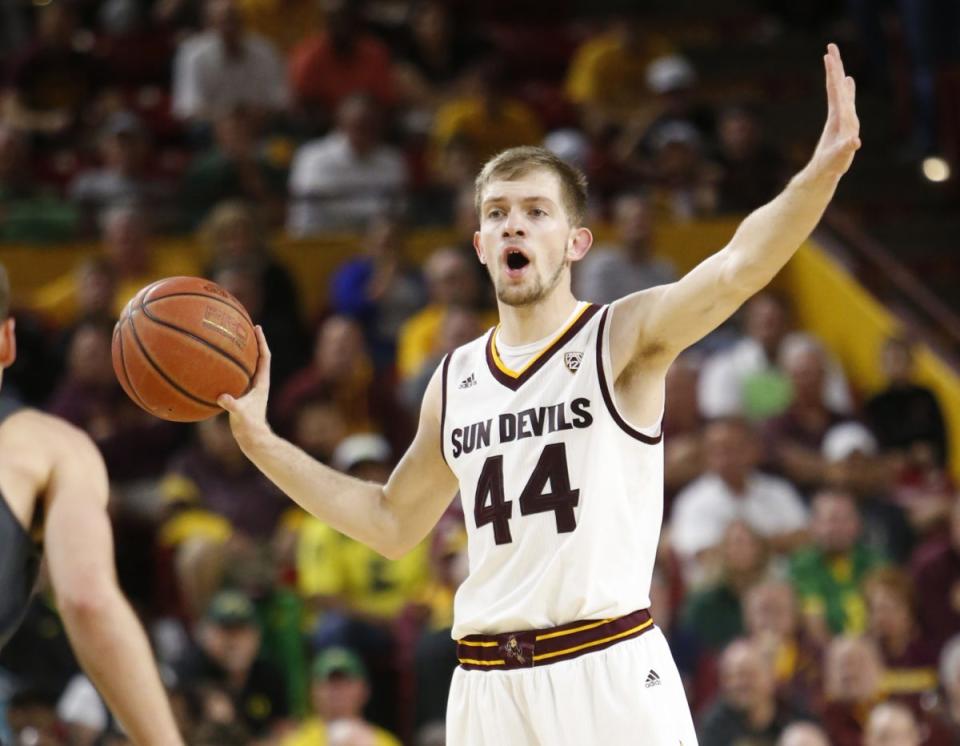Basketball has been Kodi Justice's release during life-long bout with dyslexia

When Arizona State guard Kodi Justice was a kid, he went into a local store in his hometown of Dobson, Arizona, put his bags up on the counter, and pulled out his wallet. His total appeared on the cash register screen: $12.32.
Justice gave the cashier $12.23 and couldn’t understand why the man kept saying that he had shorted him nine cents.
“I kept arguing with him and saying it was enough but then I realized I was wrong because I saw the numbers backwards,” Justice told Yahoo Sports.
In first grade, Justice was diagnosed with dyslexia, a learning disorder that causes the brain to rearrange letters, numbers and words. To this day, he sees D’s as B’s and mixes up number sequences.
Despite those challenges, Justice has successfully balanced basketball and academics the past two-plus years at Arizona State and is on pace to graduate in 2018. The 6-foot- 5 junior credits his work ethic for helping him push through his learning disorder despite having to focus twice as hard as others to learn to do things like read street signs and emails, activities that most people take for granted.
“Numbers came easily to me and reading just didn’t,” Justice said. “And at a young age, you don’t understand that when you have something that affects you, you just think, ‘Oh I can’t do it.’ So you avoid it. You just don’t do it. I had to push through that.”
When Justice was first diagnosed with dyslexia, he kind of pushed it to the side. He took a few extra reading courses but in first grade, he wasn’t expected to read much, so it was something that was easy to ignore. Issues started for him in the classroom in sixth grade when he was asked to read excerpts aloud and would mix up words, prompting classmates to make fun of him.
Basketball became Justice’s safe haven during tough times like that. While he struggled with confidence in the classroom, his confidence on the court grew.
In four years at Dobson High School, Justice averaged 13.6 points, 5.5 rebound and 4.5 assisters per game. By his sophomore year of high school, he accepted a scholarship offer from Arizona State.
“It was definitely one school I really wanted to go to,” Justice said. “I’ve always been a big hoops fan and a big ASU fan. And so when ASU offered (me a scholarship), I committed the next day. It definitely wasn’t a difficult decision.”
The 6-foot- 5 guard is one of just three returning players under second-year head coach Bobby Hurley.
After suffering a fracture in his navicular bone that cost him the final three months of his freshman season, Justice has emerged as an elite perimeter shooter the past two seasons. He has started eight straight games this season and averages 7.9 points per game and 42.6 percent 3-point shooting.
“My dyslexia doesn’t bother me on the court,” Justice said. “Basketball has always been a stress relief. Every time there is something bothering me, whether its school or life in general, you’ll find me on the basketball court – sometimes at one or two in the morning – getting shots up and listening to music and getting away from everything.”
Arizona State has yet to make the NCAA tournament in Justice’s two-plus seasons, but he’s hoping the Sun Devils are building something under Hurley. They’re 9-9 overall this season and 2-3 in league play including wins over Stanford and Colorado.
“We’ve had some bumps in the road (this year), but we’ve got the right culture at ASU right now,” he said. “And every game that were playing in, the wins and losses that we have, we always have a chance to win it and it comes down to the end. We make a few plays (differently) here and there and our records look a lot different than it is.”
The Sun Devils are preparing to face off against Lonzo Ball and No. 3 UCLA on Thursday night in Los Angeles. It’s a challenge that Justice is excited for.
“At this point I know what to expect, not just from our coach, but from the conference,” Justice said. “And so it’s my job to push everyone to help them be prepared for what we’re about to get into.”
That get-to-work, no-nonsense attitude is part of what fighting through Dyslexia taught him.
Says Justice, “I think it gave me my work ethic.”

 Yahoo Sports
Yahoo Sports 
